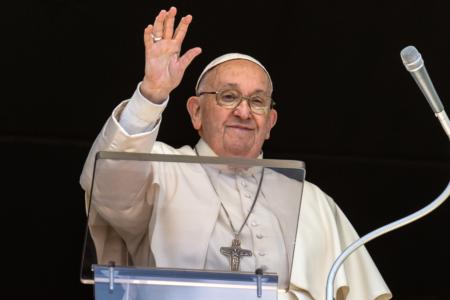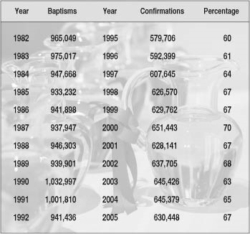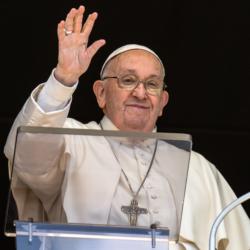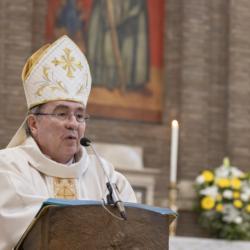Bishops are the original ministers of confirmation
Most Catholics can give you some details about their confirmation. Maybe they’ll remember the name they took -- this was never proposed, required, or even expected of Catholics. They might remember the bishop’s name, especially if he is among the more famous ones, i.e. O’Connell, Spellman, Cushing. They might remember their sponsor’s name, though most of us had a single sponsor for a whole class: a man for the boys, and woman for the girls. Not infrequently they happened to be the president of the principal men’s and women’s clubs of the parish that year!
Parents and students of the present generation are probably scratching their heads, because each candidate now has a sponsor, preferably it’s one of the two they had at baptism. There seems to be a lot more demanded of the candidates: usually a multi-year program consisting of classes, Christian service, a retreat, and maybe parent and sponsor participation in some or all aspects of this preparation. A priest once commented, “there’s more preparation to be confirmed than to be married.”
An interesting question to ask someone, especially as we live in a much more mobile society in the United States is “How old were you when you were confirmed?” You’ll be surprised to hear answers from anywhere from the fourth to eleventh grade, and sometimes later.
What’s as interesting is that you can ask almost any generation and get answers that vary widely. Massachusetts’ natives even for several generations probably have a range much more likely “between grades seven and ten.” Some dioceses in the Midwest continue to celebrate this sacrament in grade four. In not a few places bishops will confirm no one before grade ten.
The Sacrament of Confirmation, perhaps more than any of the other six sacraments has had the most varied, some might say confusing history. And however confusing the history might be, even the few comments above tell a tale of greater variety in practice.
Let’s take a look at what the Church teaches about the second sacrament of initiation -- it’s usually listed between baptism and Eucharist.
An excellent place to start is in the ‘‘Catechism of the Catholic Church.’’ Here is a superb summary of the sources, especially Scriptural; the signs; the effects of the grace of this sacrament; the recipient and the minister [nos. 1285-1321].
Beginning with the Old Testament and noting Christ’s promise in the New Testament to send the Spirit on those marked out as His followers, the catechism summarizes some of the teaching of the early Fathers of the Church.
Special attention is given to distinct practices of the Eastern and Western Churches.
Same grace, but different practices
In the East, both the Catholic and Orthodox, the ancient tradition of Confirmation, or more properly -- Chrismation -- being celebrated at the time of baptism is maintained. Indeed, in some of the Eastern Churches, first Eucharist is also celebrated at baptism. This preserved the order -- baptism-confirmation-Eucharist -- of the sacraments of initiation. However, since priests could celebrate these sacraments, it meant the bishop was personally absent from the initiation process.
In the Western Church, of which most of us are members, the importance of keeping the bishop personally involved in the initiation process gave rise to the separation of the sacraments. At first the order was maintained, i.e. no one could receive first Eucharist without having been confirmed. The bishop would come each year or every few years to a parish to celebrate confirmation. After that the children would receive their first Communions, either at that Mass or perhaps at another time soon thereafter. It is not impossible to hear even now accounts of children who received their first Communion on the day of their confirmation.
Only at the beginning of the last century during the papacy of St. Pius Tenth is there an inversion of the Confirmation and First Eucharist. What St. Pius did was to move the age of the reception of First Communion to the age of reason, which he determined to be about seven. What he did not do, but what happened any way, was that he neither stated nor implied that anyone should receive First Eucharist without having first been confirmed. Thus, for just about 100 years, in many nations including our own, the order got tumbled.
Our new bishops and
confirmation
Bishop-elect John A. Dooher and Bishop-elect Robert F. Hennessey will be celebrating this sacrament around the archdiocese according to a regular schedule. Most of the time they will be meeting young people, generally in their sophomore year of high school. These young Catholics will have likely been in a two-year program of preparation as mentioned earlier.
What will be the effects of the grace Christ will give these young people through these new bishops?
“... Confirmation brings and increase and deepening of baptismal grace.” (CCC, #1303) The special outpouring of the Holy Spirit, which is a particular aspect of the bishop’s ministry, makes us more able and willing to call God our Father because Christ is our Brother; it joins us more firmly to Christ; increases the Spirit’s gift within us; and so strengthens us that we can more readily proclaim our faith in Christ to others.
The bishop’s visit to celebrate this sacrament in any parish serves as a reminder of the link that each Catholic has to a Church that is bigger than “my parish.”
This “bigger” means that the Church, encompassing more than one billion people on this earth, is not limited by geographical or political borders -- my town, my state, my country. This Church includes countless others whom we cannot see now but to whom we are united nevertheless.
Among those who are also members of this Church are: the Blessed Virgin Mary, the multitude of saints -- canonized and uncanonized -- and those among the dead who still await their entrance to eternal life. This Church is not limited by space or time.
Christ’s gift of the Spirit through the hands of the bishop in confirmation strengthens our awareness of this truth and strengthens also our communion with one another in the Church.
Our new bishops will be sacramental mediators of the grace of Confirmation. In a unique way they will bring the Spirit to the parishes they visit and to the young people whom they will confirm. Pray for both -- our new bishops and the young people they will confirm.
Some statistics to review
and some questions to ponder
There is a box of statistics on this page which is troubling. It reveals that somewhere between 20 to 40 percent of our Catholic youth are not receiving the grace of the Sacrament of Confirmation.
These statistics come from the Official Catholic Directory. This is the reference to which researchers would likely turn for reliable information about the Roman Catholic Church in the United States.
There are two columns of sacramental statistics -- baptisms by year; and confirmations by year. Note the 13-year difference. The average age of confirmation in the U.S. is calculated at 13 for this analysis. This was determined by averaging the ages eight to 18, giving us 13. The third column is the percentage of those baptized who have not yet been confirmed.
Why so many missing? Possible answers are: a highly mobile society combined with the variety of ages, i.e. in grade eight I move to another diocese where confirmation is celebrated for second graders. No one expects an eighth grader to be in class with second graders. Don’t laugh. You could move within New England and this could be an issue.
Taking what the priest noted about preparation: are the programs too rigid and excessively demanding? The Church has few and minimal requirements for one to be confirmed. Have we added too much and perhaps turned some away?
Are we becoming too much like our society and “giving” Confirmation as a reward for accomplishing something or treating it virtually as a graduation from religious formation? In doing this do we then either subtly, or not so subtly, convey this not only about confirmation but about the other sacraments? Grace is thus cheapened as our gift to someone because they “earned” it, while in fact “grace is freely given by God: and unmerited, it cannot be ‘earned.’’’
For further reading: Confirmation: The Baby in Solomon’s Court, Paul Turner, Paulist Press, 1993. Liturgical Ministry, Volume 9, Spring, 2000, Confirmation (subject of entire issue). “A Review of Confirmation: Reexamining the Tradition”, Dana Pelotte, SSS. http://blessedsacrament.com/theology/dana1.html is an excellent summary of some of the issues referred to in this article.



















